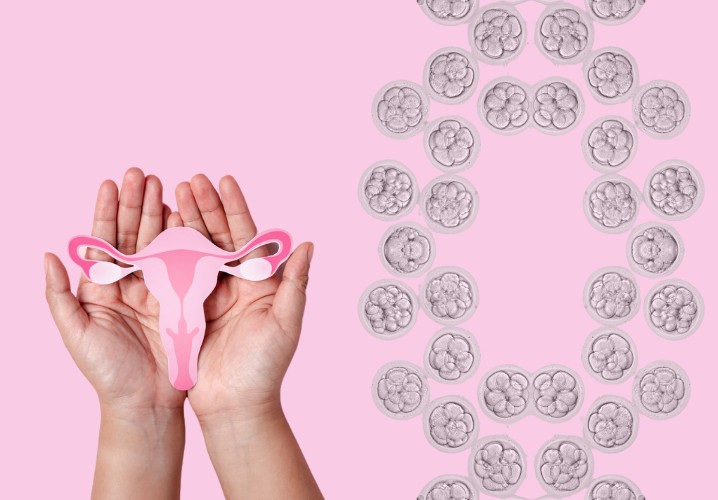Everything You Need to Know about PCOS and IVF

Polycystic ovarian syndrome (PCOS) is a hormone disorder syndrome that affects between 5% to 10% of women. However, the World Health Organization reports that up to 70% of those with PCOS aren’t yet diagnosed.
If you have PCOS, you may experience irregular periods (or no periods at all) and symptoms of high androgens (like testosterone and DHEAS), causing excessive hair growth and acne. The anovulation associated with irregular periods can make trying to conceive difficult. PCOS is the most common reason women experience infertility. However, the World Health Organization reports that up to 70% of those with PCOS aren’t yet diagnosed.
Fortunately, PCOS is a well-studied cause of infertility and can usually be treated successfully. While first-line treatments such as Letrozole or Clomid with intercourse or intrauterine insemination (IUI) often can be enough to achieve pregnancy, this article will focus on treating PCOS with in vitro fertilization (IVF).
What is PCOS?
PCOS can look different for everyone, and symptoms can often change, corresponding with age and fluctuations in body weight.
It’s common to have different symptoms and lab values than another person with the same diagnosis.
PCOS is a complex health condition with no known cause. There isn’t one test or lab value that can tell you if you have PCOS. Instead, your fertility specialist will do a physical exam, blood tests, and ultrasound to make a diagnosis using a tool called the Rotterdam criteria.
- Higher than normal levels of androgens in your blood.
- Irregular or missed periods because you’re not ovulating.
- Numerous small cysts on the ovaries can be seen on an ultrasound. In 2023, the American Society of Reproductive Medicine amended these guidelines to include the use of anti-mullerian hormone (AMH) in testing. An AMH blood test can replace the need for an ultrasound since having a higher-than-normal AMH level might show you have PCOS.
Can I do IVF if I have PCOS?
IVF usually isn’t the initial step for treatment in getting pregnant when you have PCOS, unless there are accompanying fertility concerns, such as poor sperm quality in a male partner.
Your fertility specialist may suggest other treatment protocols using fertility medications such as Letrozole or Clomid. Sometimes a cycle is treated with gonadotropins which are more frequently used with IVF. These medications support regular ovulation, in combination with timed intercourse or IUI. But in some cases, IVF can be necessary to become pregnant.
Though IVF is more invasive and expensive than other fertility treatments, for many people, it is the most successful treatment option for achieving pregnancy.
When you use fertility medications in timed intercourse or IUI cycles, there is a risk of the follicles releasing more than one egg at once, which increases the chances of multiples. This may result in a canceled cycle and compel couples to refrain from intercourse to avoid this risk.
With IVF, you can produce multiple high-quality embryos each cycle, that can be frozen and transfered back one at a time as necessary.
When you use fertility medications in timed intercourse or IUI cycles, there is a risk of the follicles releasing more than one egg at once, which increases the chances of multiples. This may result in a canceled cycle and compel couples to refrain from intercourse to avoid this risk.
With IVF, you can produce multiple high-quality embryos each cycle, that can be frozen and transfered back one at a time as necessary. IVF treatment protocols can also be personalized to you and your needs to have the best chances of a successful pregnancy.
IVF protocols for PCOS
During IVF, medications help stimulate the ovaries to make multiple mature eggs instead of just one. The most common IVF protocols for PCOS are low-dose antagonist protocols so that we can minimize the risk of ovarian hyperstimulation syndrome (OHSS).
Higher dose antagonist protocols, as well as downregulation protocols, are other options, but they are not as common for patients with PCOS.
Low Stimulation Antagonist Protocols (Mini IVF)
Antagonist protocols use gonadotropins (FSH and sometimes LH) for around 9-12 days to stimulate egg growth. Gonadotropin-releasing hormone (GnRH) antagonists are added around the 6th day to prevent premature ovulation. Sometimes, we will use a medication called Provera to prevent ovulation since those with PCOS will often do a frozen embryo transfer to reduce the risk of OHSS.
Mini IVF is a non-standardized term used to describe an IVF protocol that uses a low dose of FSH, LH, and or Clomid/Letrozole to stimulate the ovaries.
The goal of mini IVF is to optimize the quantity of mature eggs retrieved while preventing overstimulation of the ovaries. This lowers the chances of OHSS, which those with PCOS are at high risk for. Mini IVF is also substantially lower in cost compared to traditional IVF protocols.
CNY Fertility commonly uses two mini IVF protocols for those with PCOS. Both protocols are the same outside of adding LH to one of them.
Once your fertility provider sees that the follicles have reached a certain size, a GnRH antagonist like Cetrotide or Ganirelix will be used to prevent the eggs from ovulating before the IVF egg retrieval.
CNY Fertility commonly uses two mini IVF protocols for those with PCOS. Both of these protocols are the same outside of the addition of LH to one of them.
- Mini Protocol 1: This protocol uses FSH (for about 10 days) and Letrozole (for about 5 days) to stimulate egg development.
Once your fertility provider sees that the follicles have reached a certain size, a GnRH antagonist like Cetrotide or Ganirelix will be used to prevent the eggs from ovulating before the IVF egg retrieval. [references link=”https://www.ncbi.nlm.nih.gov/pmc/articles/PMC3945257/” text=”GnRH Antagonist IVF Protocol in PCOS”/]
- Mini Protocol 2: Same as above, only LH is also taken for 10 days alongside FSH. This can come in the form of an HCG-LH injection or Menopur.
Down-regulation protocol
Down-regulation protocols are rarely used today due to their inefficiency and risks when compared to well-controlled antagonist protocols.
Down-regulation protocols involve taking a medication called Lupron, starting the medication before the IVF cycle, and continuing during the use of FSH to “downregulate” the hormones and prevent the eggs from ovulating too early.
This may be beneficial for some, but requires more injections, is generally costlier, and can increase the chances of OHSS.
OHSS is a serious medical condition and possible complication of IVF where the ovaries become hyperstimulated and enlarged. OHSS can occur after an egg retrieval (usually about 5-10 days after) because your estrogen is high and has been persistently high. Pregnancy can exacerbate this condition, which is why frozen embryo transfers are recommended in this circumstance.
OHSS symptoms are on a spectrum from mild to severe. The level of severity will dictate the specific treatment protocol.
As estrogen levels rise during the stimulation period, the vessels in the body can become “leaky,” causing a fluid overload, usually in the abdomen and/or lungs.
Your blood also becomes thicker, which can increase the risk of kidney damage and blood clots in cases of severe OHSS.
Luckily, with low-dose antagonist protocols, severe OHSS is very uncommon and happens less than 1% of the time. However, it is a real risk to consider. If you have PCOS, your fertility provider may prescribe a medication such as metformin to reduce serum androgen levels, improve insulin sensitivity, and thereby help to prevent OHSS. In some cases, metformin can help restore ovulation.
PCOS and IVF success rates
For many people with PCOS, IVF is successful. But since PCOS can be a complex diagnosis, there are different factors to consider when it comes to your chances of pregnancy.
Data from a 2020 study by the Society for Assisted Reproductive Technology (SART) demonstrated that women aged 35 and below had a live birth rate of about 51% when using their own eggs.
In contrast, that percentage decreases with age. In women between the ages of 38 to 40, the success rate falls to about 25%.
The good news for people with PCOS is that research has found that pregnancy rates in people with PCOS were similar in those without PCOS.
However, researchers have also found that while those with PCOS tend to have higher AMH (corresponding with better ovarian reserve) levels than the general population, AMH levels decrease more rapidly with age in those with PCOS.
The Bottom Line on PCOS and IVF
Having PCOS doesn’t mean you can’t get pregnant, although it may make it more challenging. There are many treatment options available, and working with your care team can help you manage your symptoms, take charge of your fertility, and ultimately conceive.
Give us a call today or request an appointment online with one of our CNY Fertility specialists. We’ll review your options and develop a treatment plan tailored to you and your family planning goals.

